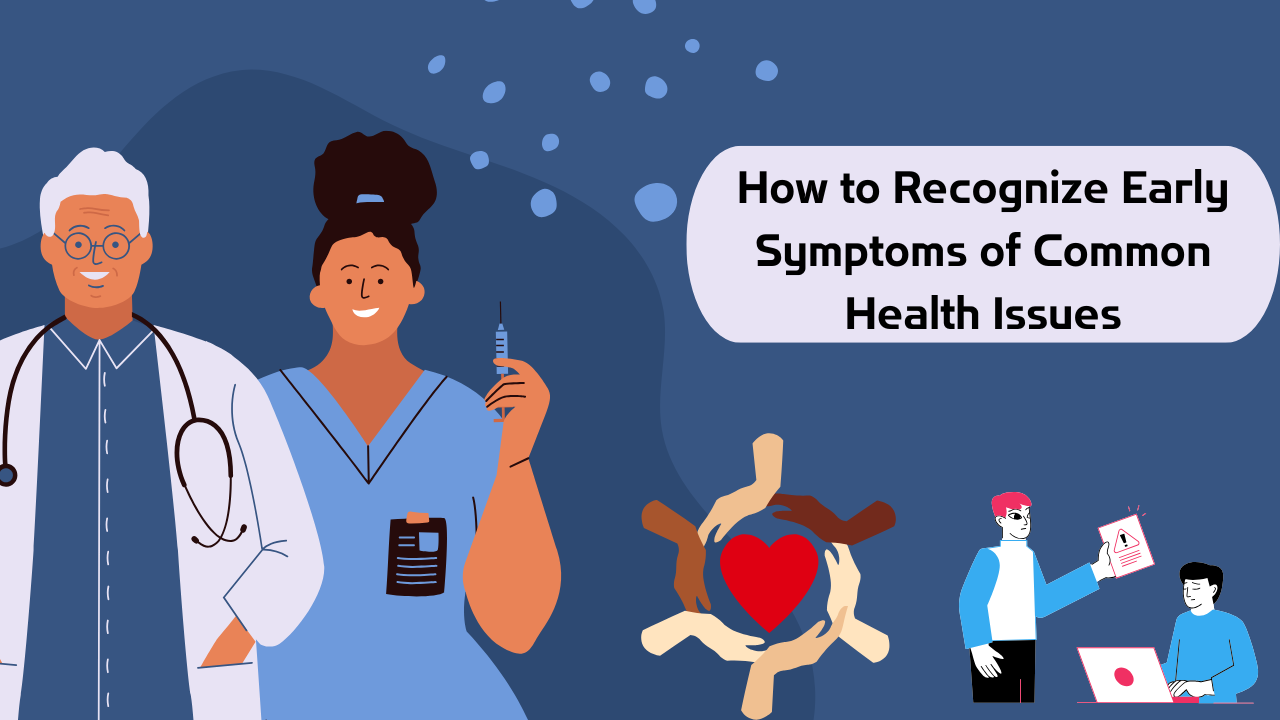Introduction
Have you ever brushed off fatigue, frequent headaches, or a nagging cough, assuming it was just stress or a minor inconvenience? Many serious health conditions begin with subtle symptoms that are easy to ignore. However, these early warning signs can provide crucial insights into your health, allowing you to seek medical attention before a condition worsens.
Recognizing early symptoms of common health issues not only increases the chances of successful treatment but also helps in maintaining a high quality of life. This guide will help you understand the first signs of serious illnesses like heart disease, diabetes, mental health disorders, cancer, and digestive issues. By learning what to watch out for, you can take timely action to protect yourself and your loved ones.
1. Why Early Detection is Crucial

Early detection of diseases has a profound impact on health outcomes. Many medical conditions are manageable or even reversible when diagnosed in their initial stages. Ignoring warning signs, on the other hand, can lead to severe complications, expensive treatments, and even life-threatening consequences.
Benefits of Early Detection:
✔ Higher Treatment Success Rates: Conditions like cancer, diabetes, and heart disease respond better to early intervention.
✔ Prevention of Severe Complications: Identifying diseases early can help in managing symptoms effectively, reducing long-term damage.
✔ Reduced Healthcare Costs: Treating illnesses at an early stage is often less expensive than managing advanced disease.
✔ Improved Quality of Life: Addressing health issues early prevents them from interfering with daily activities and well-being.
Let’s dive into some of the most common health issues and their early symptoms.
2.1 Heart Disease: Recognizing Silent Warnings

Heart disease is the leading cause of death worldwide. However, many people don’t recognize the warning signs until it’s too late. While heart attacks are dramatic events, the body often provides subtle clues before a major cardiac event.
Early Symptoms of Heart Disease:
- Chest Discomfort: A feeling of tightness, pressure, or mild pain in the chest, especially during physical exertion.
- Shortness of Breath: Feeling breathless while performing routine activities such as walking or climbing stairs.
- Unusual Fatigue: Feeling extremely tired even after adequate rest.
- Pain in the Arms, Neck, Jaw, or Back: This discomfort can sometimes precede chest pain or appear independently.
- Dizziness or Lightheadedness: Sudden dizziness or fainting spells can be a sign of heart trouble.
Preventive Measures:
- Monitor blood pressure and cholesterol levels regularly.
- Follow a heart-healthy diet rich in fruits, vegetables, and whole grains.
- Engage in regular physical activity to strengthen the heart.
- Avoid smoking and limit alcohol consumption.
2.2 Diabetes: Noticing Subtle Signs Before It’s Too Late
Diabetes affects millions of people worldwide, and its symptoms can be misleading. Many individuals remain undiagnosed for years, which can lead to serious complications like kidney disease, nerve damage, and heart problems.
Early Symptoms of Diabetes:
- Frequent Urination: Increased trips to the bathroom, especially at night.
- Excessive Thirst: Feeling constantly thirsty despite drinking plenty of fluids.
- Unexplained Weight Loss: Losing weight despite normal eating habits.
- Extreme Hunger: Feeling hungry shortly after meals.
- Slow Healing of Wounds: Cuts and bruises that take longer to heal.
- Blurred Vision: Changes in vision due to fluctuating blood sugar levels.
Preventive Measures:
- Maintain a healthy weight and avoid excessive sugar intake.
- Exercise regularly to keep blood sugar levels in check.
- Get tested for diabetes if you have a family history of the condition.
- Include fiber-rich foods in your diet to improve glucose metabolism.
2.3 Mental Health Disorders: When to Seek Help
Mental health disorders like depression and anxiety often go unnoticed because their symptoms can be subtle. Many people dismiss emotional and psychological distress as mere stress or temporary sadness. However, prolonged symptoms can indicate a more serious condition.
Early Symptoms of Mental Health Disorders:
- Persistent Sadness or Hopelessness: Feeling down or uninterested in life for more than two weeks.
- Changes in Sleep Patterns: Difficulty sleeping or oversleeping.
- Loss of Interest in Activities: No longer enjoying hobbies or socializing.
- Irritability and Mood Swings: Unusual changes in mood that affect daily interactions.
- Difficulty Concentrating: Trouble focusing on work, school, or daily tasks.
Preventive Measures:
- Talk to a mental health professional if symptoms persist.
- Practice stress-reducing activities like meditation and exercise.
- Stay socially connected with friends and family.
- Seek support groups or therapy if needed.
2.4 Cancer: Recognizing the Red Flags
Cancer is one of the most feared diseases, but early detection significantly improves treatment outcomes. The body often signals cancer development through small, seemingly harmless symptoms.
Early Symptoms of Cancer:
- Unexplained Weight Loss: Losing weight without changes in diet or exercise.
- Lumps or Swelling: Any unusual lump, especially in the breast, neck, or groin, should be examined.
- Changes in Moles or Skin Texture: Irregular, growing, or bleeding moles can indicate skin cancer.
- Persistent Cough or Hoarseness: A chronic cough that doesn’t improve should be evaluated.
- Unusual Bleeding or Bruising: Blood in the stool, urine, or unexplained bruises may indicate internal issues.
Preventive Measures:
- Get regular screenings for breast, cervical, and colon cancer.
- Avoid smoking and limit alcohol intake.
- Protect your skin from excessive sun exposure.
- Eat a diet rich in antioxidants and maintain a healthy lifestyle.
2.5 Digestive Disorders: Paying Attention to Your Gut
Your digestive system is a key player in overall health, and persistent stomach issues may indicate serious underlying conditions.
Early Symptoms of Digestive Disorders:
- Chronic Bloating and Gas: Frequent bloating may signal irritable bowel syndrome (IBS) or food intolerances.
- Acid Reflux and Heartburn: Persistent acid reflux may indicate gastroesophageal reflux disease (GERD).
- Changes in Bowel Habits: Chronic diarrhea, constipation, or blood in the stool should never be ignored.
- Abdominal Pain: Recurring stomach pain, especially after meals, could be a sign of ulcers or gallbladder disease.
Preventive Measures:
- Eat a fiber-rich diet and stay hydrated.
- Avoid excessive caffeine, alcohol, and processed foods.
- Manage stress, as it can affect digestion.
- Seek medical advice if symptoms persist for more than two weeks.
3. How to Stay Proactive About Your Health
Now that you know the early symptoms of common diseases, here are some proactive steps you can take:
✅ Get Regular Check-Ups: Don’t wait for symptoms to appear—schedule annual physical exams.
✅ Listen to Your Body: Pay attention to changes and seek medical advice when something feels off.
✅ Maintain a Healthy Lifestyle: A balanced diet, regular exercise, and proper sleep go a long way in preventing illnesses.
✅ Educate Yourself: Stay informed about health risks and screening guidelines from reputable sources.
4. Expert Resources and Credible References
For more in-depth information, check out these trusted sources:
- American Heart Association: Heart Attack Warning Signs
- Centers for Disease Control and Prevention (CDC): Diabetes Symptoms
- National Cancer Institute: Signs of Cancer
- National Institute of Mental Health: Mental Health Signs
Conclusion: Take Control of Your Health Today
Early detection of diseases can save lives. By paying attention to subtle symptoms, you can seek medical advice before minor issues turn into major health crises. If you’ve noticed any of these symptoms in yourself or a loved one, take action now. Your health is in your hands—listen to your body and prioritize your well-being.
What small health habit can you start today to protect your future?
Readmore…https://totalinsights.online/wp-admin/post.php?post=28902&action=edit

